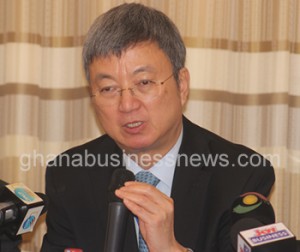Ghana’s programme on track, tough environment due to debt – IMF Deputy MD
 The Deputy Managing Director of the International Monetary Fund (IMF) Mr Min Zhu says Ghana’s $918 million Extended Credit Facility (ECF) programme is on track and the country has made good progress.
The Deputy Managing Director of the International Monetary Fund (IMF) Mr Min Zhu says Ghana’s $918 million Extended Credit Facility (ECF) programme is on track and the country has made good progress.
“The programme is on track and we welcome the strong commitment from the authorities,” Mr Min Zhu told journalists at a press briefing in Accra.
The Deputy Managing Director said the Ghana government is implementing structural reforms and tackling energy issues and “the whole economy is moving in the right direction” – growth is expected to get stronger, and inflation and government cash deficits to fall.
Ghana’s $918 million ECF was approved on April 3, 2015 to restore debt sustainability and macroeconomic stability.
About $343.7 million has been disbursed by the IMF and Ghana’s debt level hovers around the 70 per cent mark (of GDP)
“We expect to see debts peak end of this year and the debt trajectory to be on the downside from 2017,” he said.
Mr Zhu said the challenging business environment – weak exchange rates and the high inflation, interest rates and financing costs – are due to the country’s debts and budget deficits and underscore the need for fiscal discipline and fiscal consolidation.
Amidst government assurances to avoid the ritual election year budget overruns, a primary surplus of 2 per cent has been targeted for 2016 ending, which will require improved tax administration, elimination of tax exemptions and improved public financial management.
“We will work together with government. The first and foremost issue is to stick on fiscal discipline. If we can stick on fiscal discipline, we will be able to stabilize debts and you will see the trend will change towards the downside,” he said.
He however added the caveat that if there are further slippages in fiscal management, it will make debt management and debt refinancing “extremely difficult”.
The Deputy MD conceded that Ghana faces some domestic and international challenges.
From the outside, global economic growth is moderate and amidst the weak exports, trade, GDP and capital flows, volatility in the capital markets is also expected to continue in the next twelve months.
Oil prices would also remain low for many months around the $40 to $50 per barrel range though the IMF does not see oil prices reaching as low as the dreaded $10 per barrel being projected by some.
Min Zhu advised that while oil prices are low, Ghana needs to leverage on its comparatively strong private sector, to diversify exports.
By Emmanuel Odonkor
